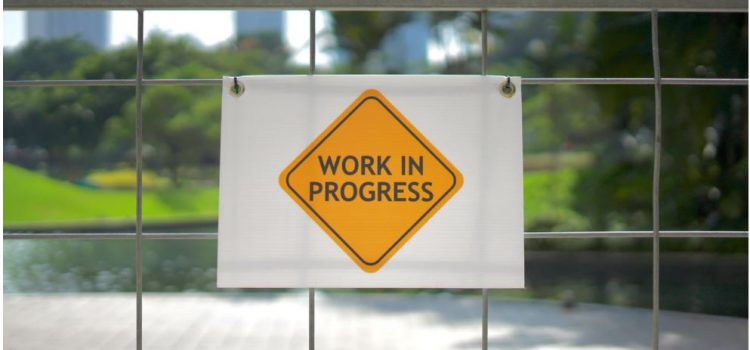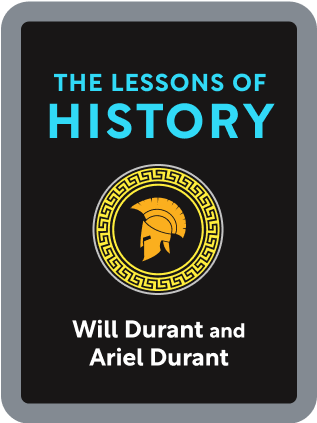

This article is an excerpt from the Shortform book guide to "The Lessons of History" by Will Durant and Ariel Durant. Shortform has the world's best summaries and analyses of books you should be reading.
Like this article? Sign up for a free trial here .
Is human progress real, or does history just repeat itself? As civilizations rise and fall, does humanity itself move forward?
In The Lessons of History, Will and Ariel Durant provide their respected historical analysis of civilization and human progress. They argue that history generally repeats itself because human nature doesn’t change. However, they believe we’ve entered unprecedented times and have a reason for cautious optimism.
Read more to learn a historical perspective of human progress.
Human Progress in History
The authors define civilization as “social order promoting cultural development.” Social order is granted by the political order of custom, laws, and morals, and economic order through production and trade.
Looking back at history, all civilizations have ended. What are the patterns of civilization’s growth and decay?
In general, the pattern is one of coherent construction, then of individualistic deconstruction.
- Civilizations often begin as a conquest of one group by another, and the spreading of the victor’s modus operandi.
- Growth occurs as a result of taking advantage of a physical boon (land, water); directing people to productive work; to internal tension between the rulers and the ruled; of meeting external challenges (human or natural) and overcoming them.
- Decay occurs as a failure of political or intellectual leaders to meet new challenges – natural disaster, improper uses of resources, economic changes, energy-sapping taxation, class war, external threat, or moral upheaval through education leading to secularism.
- The final blow may come from a major defeat in war.
On internal strife, the authors have an elitist perspective: as a natural result of inequality, society may be divided between a cultured minority and a majority of people unable to adopt the standards of “excellence and taste.” As this majority grows, it drags down the minority – its judgment and thoughts pollute upward, and the society undergoes a mass “barbarization.” This is the price that the minority pays for its unequal control of wealth.
Does history necessarily repeat itself? By and large, it has, because human nature is a relative constant. Humans react in stereotyped ways to frequently occurring situations like hunger and danger.
But the authors argue we are in an unprecedented time of development, where individuals are more differentiated than in primitive societies, and many novel circumstances will arise that demand novel responses. They say, with cautious optimism, that “there is no certainty that the future will repeat the past.”
Inevitably civilizations will fall, but this is not something to be bemoaned. What is gone is the frame; what was created in that civilization can be immortal. Civilizations pass its accomplishments onto their heirs. To wit, more people read Homer today than did in his time.
Is Human Progress Real?
If history repeats itself endlessly, then is humanity actually making progress?
It depends on how you define progress.
- Cultural: Is Shakespeare better than Aeschylus? Nietzsche over Confucius?
- Religion: As we become more secular, have we developed a natural ethic strong enough to keep us from our baser instincts? Or will chaos and confusion prod us back to the order of religion?
The authors have no strong conclusion. History has so many examples and counterexamples that almost any conclusion can be drawn, depending on what lens you look through.
If human progress is defined as humanity’s control over the environment, there is certainly progress.
- Quality of life for the average person is way up compared to primitive times. “If undertakers are miserable, progress is real.”
If human progress is defined as an increase in happiness, then there has been little progress.
- Humans will always find a way to be miserable. There is a perverse pleasure in rejecting the universe as unsatisfying and incomplete.
- We romanticize our ancestors who had to worry only about their local village. As the world’s complexity increases, our perceived troubles rise in kind.
Yet human nature has seemed largely fixed. Science and technology are new means of achieving the same old ends – acquisition of goods, sex, and power.
- Science is neutral – it can kill us as readily as it will heal.
- We are “the same trousered apes at two thousand miles an hour.”
An Optimistic Note
The achievements of civilization (fire, wheel, language, agriculture) have passed from one to the next. They connect eras to each other, back to the beginnings of biology.
The amount of achievement in human history is staggering. Interrupt this transmission for 100 years and we return to being savages.
Education is the transmission of a multifactorial heritage – our modes of thought, morals, technology, and culture. This heritage is richer than ever before, including all of Greek thinking and the Italian Renaissance.
History is the creation and recording of this heritage. Progress is its increasing abundance, preservation, transmission, and use.
Human progress, while tied to the rise and fall of civilizations, ultimately follows its own path.

———End of Preview———
Like what you just read? Read the rest of the world's best book summary and analysis of Will Durant and Ariel Durant's "The Lessons of History" at Shortform .
Here's what you'll find in our full The Lessons of History summary :
- What we can learn from studying 5,000 years of history
- How human nature hasn’t changed over thousands of years
- Why all civilizations, including ours, fall, and why we shouldn’t cry about it






